Posts by Christopher Lochhead
126 Grief & Happiness For The Holidays w/ Dushka Zapata
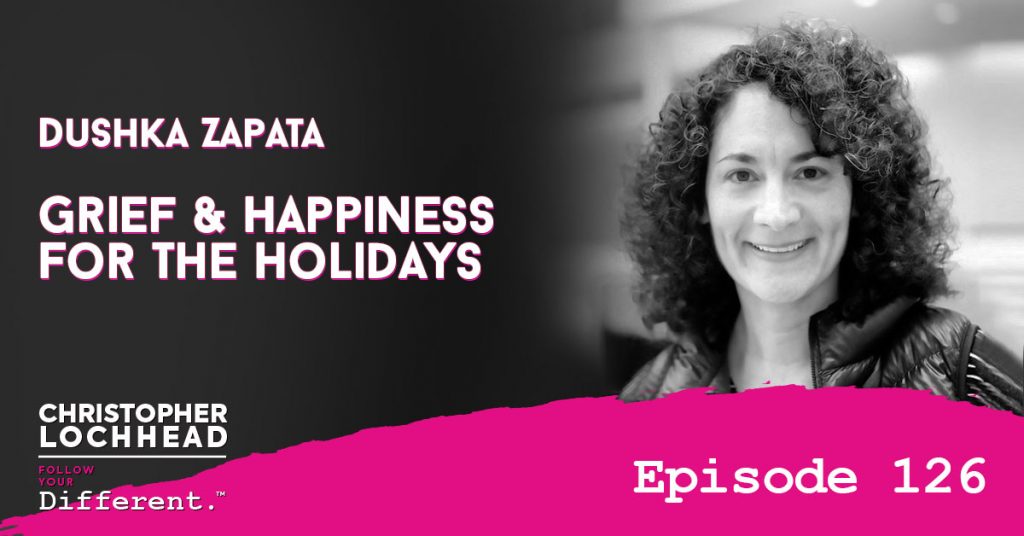
Podcast: Play in new window | Download (Duration: 33:26 — 46.1MB) | Embed
Subscribe: Apple Podcasts | Spotify | Pandora | RSS | More
Today, one of the most prolific and important writers in the world, Dushka Zapata, joins us for a very unusual but moving discussion. They talk about grief, happiness and why its okay to opt-out for the holidays. Her work has been viewed over 150 million times on Q & A site Quora.
This might be the most different conversation you’ve ever heard about the holidays!
Remembering Those We Have Lost
The holidays are wonderful celebratory times for us to focus on our friends, family and for many of us, our faith. For many of us, the holiday season can be a happy season. However, there are quite a number who have moments of some sorrow. The holidays, intentionally or unintentionally, reminds us of the people we have lost.
“As you know, I write a lot at Quora. A lot of questions I answer are about people who are asking permission.’Is it normal for me to be sad? How long should grief last? i lost my dog four years ago and I’m still mourning, is that normal?’ To me, my answer is always, ‘who cares?’ Who cares if it’s normal? You should feel whatever it is that you’re feeling. Who is it that is an authority on regulating what other people should or shouldn’t be feeling?” – Dushka Zapata
The 7 Steps To Overcome Grief
Christopher shares that there are no 7 steps to overcome grief. Some people advise those who are grieving with tips on how to cope but the reality is, there are no stages to grief and Dushka says its totally acceptable.
“I think so many people want to help but I’m going to tell you, asking someone to cheer up when they’re grieving is like sitting on someone’s chest when they’re trying to breathe.” – Dushka Zapata
A Happy Person Who Grieves
Dushka shares some personal stories on how she considers herself as a happy person who grieves. The primary reason she grieves during December was her father passed away that month. Ever since, she has not celebrated the holiday.
“I just feel like we should all be making that space for others. It’s okay to grieve, it’s okay to be sad, it’s okay to hate the holidays, its okay to not want other people to have a happy holiday because you just can’t do that to another person, to be happy, forceful happiness, its okay.” – Dushka Zapata
To hear more information about Dushka Zapata and to listen to why its okay to feel grief over the holidays, download and listen to the episode.
Bio:
Dushka Zapata is one of the most prolific and popular writers working today.
On question and answer site Quora her work has been viewed over 150 million times.
She’s the author of eight best-selling books.
Dushka has over 20 years experience as a senior communications executive in Silicon Valley.
When she’s not writing, she serves as a communications executive at tech juggernaut Zendesk.
Links:
Love Yourself: and Other Insurgent Acts That Recast Everything
You Belong Everywhere: and Other Things You’ll Have to See for Yourself
We hope you enjoyed this episode of Follow Your Different™! Christopher loves hearing from his listeners. Feel free to email him, connect on Facebook, Twitter, Instagram and subscribe on iTunes! Get amazing, different stories on business, marketing, and life. Subscribe to our newsletter The Difference.
125 Bas Rutten: How to over-come anything w/ UFC Hall of Famer & O2 Trainer Inventor
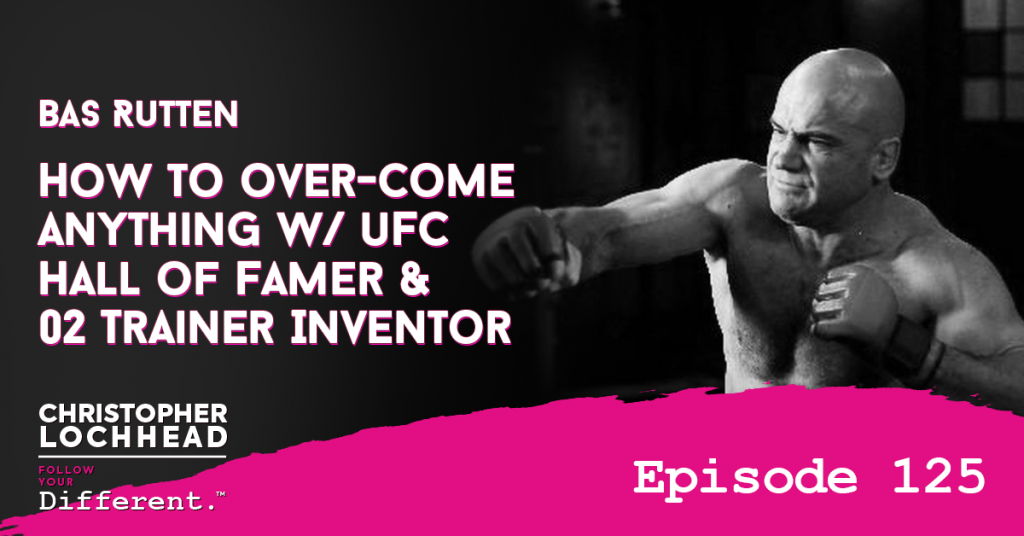
Podcast: Play in new window | Download (Duration: 1:04:04 — 117.4MB) | Embed
Subscribe: Apple Podcasts | Spotify | Pandora | RSS | More
One of Christopher Lochhead’s hero, UFC Hall of Famer and MMA legend Bas Rutten joins us today for another powerful and insightful conversation. We talk about how as a Dutch Kid, Bas, over-came horrible asthma and eczema, and bullying to become, the “Baddest Man in the World.” He shares about his outlook in life, his techniques when learning a new skill and a lot more.
Fun, Playful and Affable
Bas Rutten shares how some people see his life as almost like a cartoon character. He shares how he did a commercial for Cartoon Network focusing on anti-bullying and getting fit. These campaigns were personally moving for him as he was bullied when he was young due to severe asthma and eczema.
“I know people who have asthma 365 days a year. I know people who are covered with eczema. Compared to them, this is not really that bad. That was my outlook always in life. There’s always somebody, out there who has it worse than you.” – Bas Rutten
Greatest and Most Terrifying
Bas is a Sensei, commentator, and inventor. He is also the former UFC Heavy Weight Champion of the World. He scored 13 knockdowns without getting dropped, become the most accurate striker in UFC history with 70% accuracy and ended his career on a mind-blowing 22-fight winning streak.
“I found out about that [statistics] when I was inducted in the Hall of Fame. That was so cool. That was my fighting style. I don’t want to waste things. I like to look for openings. The opponent, most of the time gives the knock out for me. He’ll make a mistake, if he punches, the body is open.” – Bas Rutten
Overcoming Everything
Non-fans will definitely love this episode and will surely learn a ton from Bas. His mindset around losing, overcoming adversity and the drive to learn new skills, Is something we can all learn from.
Bas is also an entrepreneur and inventor. His new O2 Trainer is fast becoming a must-have for professional athletes, weekend warriors and among people with asthma and breathing challenges. The O2 trainer strengthens the lungs and breathing muscles.
To hear more information about Bas Rutten and to listen to his ideas how to over-come anything, download and listen to the episode.
Bio:
Sebastiaan “Bas” Rutten (Dutch pronunciation: [ˈbɑs ˈrʏtə(n)];) is a Dutch retired mixed martial artist (MMA), Karate and Taekwondo blackbelt, and Muay Thai kickboxer.
He was a UFC Heavyweight Champion, a three-time King of Pancrase world champion, and finished his career on a 22 fight unbeaten streak (21 wins, 1 draw ).
Bas has been inducted to the UFC Hall of Fame in 2015.
He suffered severe asthma in his childhood years and inspired by his struggle breathing developed the O2 Trainer.
When Bas is not teaching at his gym in Westlake Village, he might be working on some acting or commentating at Karate Combat with Kenny Rice.
Links:
Also, special thanks to Luis Congdon for the kind introduction.
We hope you enjoyed this episode of Follow Your Different™! Christopher loves hearing from his listeners. Feel free to email him, connect on Facebook, Twitter, Instagram and subscribe on iTunes! Get amazing, different stories on business, marketing, and life. Subscribe to our newsletter The Difference.
027 How To Create a New Category & Brand w/ Carrie Palin, CMO of $20B Splunk
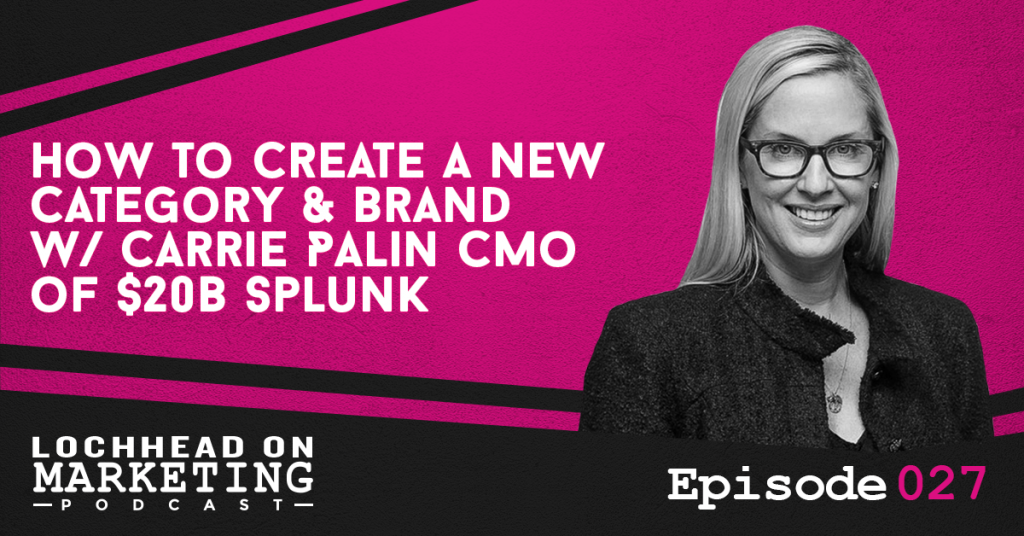
Podcast (lochheadonmarketing): Play in new window | Download (Duration: 25:10 — 34.6MB) | Embed
Subscribe: Apple Podcasts | Spotify | RSS | More
This special episode of Lochhead on Marketing is the actual conversation of Christopher Lochhead and Carrie Palin, CMO of software company Splunk, during their appearance at Hypergrowth San Francisco.
Carrie shares how she spearheaded the category creation of Data to Everything and brand re-launch of Splunk.
Splunk at Hypergrowth
Christopher Lochhead and Splunk CMO Carrie Palin were invited to speak at Hypergrowth San Francisco to talk about creating a new category and brand. Drift organized this awesome business and marketing conference. This conversation is a rare opportunity to go behind the scenes of a very successful, super high-growth company like Splunk.
“At Splunk, we’re very proud of our culture. We’re very proud of our history. There’s something we call Splunkiness.” – Carrie Palin
Splunk is a publicly-traded software company worth $20B and they have recently launched a new category called Data to Everything. They have also relaunched their brand, changing their logo from green and black to orange and pink.
Rough Start
Carrie shared that her forte is in demand generation and she found category creation and branding to be quite challenging. She notes that aside from having a great branding team, she had great bosses who believed in her vision.
It was a rough start for Carrie, as three days into her new role, she received a piece of unfortunate news about her ailing father. It was one of the challenging events of her life but she acknowledged that Splunk CEO and President had been supportive of her grief.
“Splunk stuck with me. They treated me like I’ve been there 20 years versus 3 days. Four months after that, it was crazier than I ever anticipated. Now that was through that, I know that it was absolutely the right place for me to be.” – Carrie Palin
On-boarding the BOD
Carrie shared amazing stories on how she on-boarded the Board of Directors with her ideas. She gave a lot of weight on conviction and commitment to the Board.
“Listen to your data. Turn your data into doing, which is exactly what our clients are doing. They’re doing really incredible things.” – Carrie Palin
To hear more about How To Create a New Category & Brand w/ Carrie Palin, CMO of $20B Splunk, download and listen to the episode.
Bio:
Carrie Palin has been Splunk’s Senior Vice President, Chief Marketing Officer since 2019.
Prior, Ms. Palin served as the Chief Marketing Officer at SendGrid, a digital communications platform company acquired by Twilio, from 2018 to 2019.
From 2016 to 2018, Ms. Palin served as the first Chief Marketing Officer and Senior Vice President at Box, a cloud content management company.
Ms. Palin served as the Vice President of Marketing for IBM’s Cloud Data Services and Analytics Software Division from 2015 to 2016.
She also previously spent over 15 years at Dell leading various marketing organizations. Ms. Palin holds a B.S. Communications degree from Texas Christian University.
Links:
We hope you enjoyed this episode of Lochhead on Marketing™! Christopher loves hearing from his listeners. Feel free to email him, connect on Facebook, Twitter, Instagram and subscribe on iTunes! You may also subscribe to his newsletter, The Difference, for some amazing content.
124 John McAfee For President
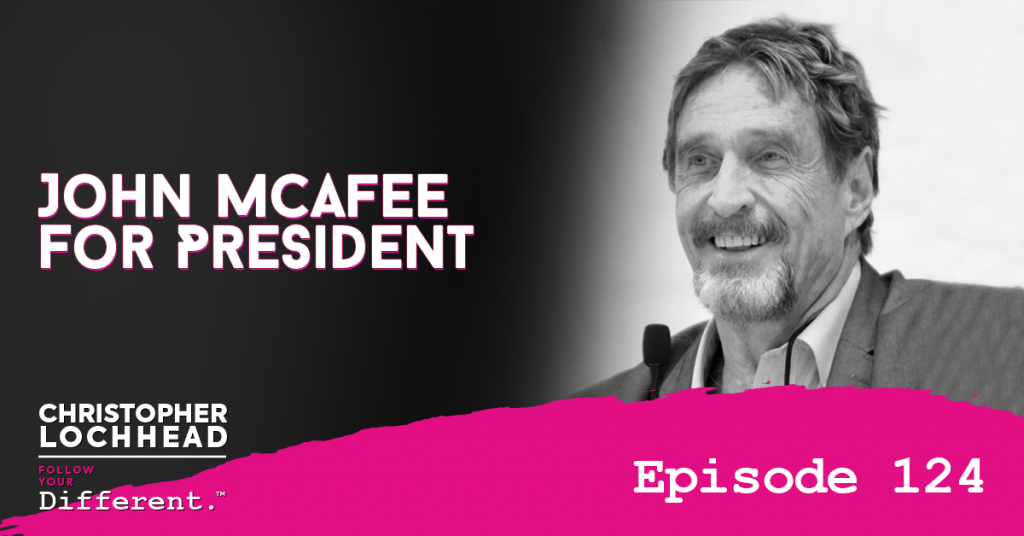
Podcast: Play in new window | Download (Duration: 44:02 — 60.6MB) | Embed
Subscribe: Apple Podcasts | Spotify | Pandora | RSS | More
After breaking the internet with our Mia Khalifa Episode 111, we are bringing you another episode with John McAfee, Legendary Silicon Valley entrepreneur, and 2020 U.S Presidential candidate. He joins us to share his experiences in Silicon Valley and talks about why he thinks “it doesn’t matter who the President is. This will no doubt be one of our most controversial episodes.
Then and Now
John has been called “The most interesting man in the world.” He was an outlaw, from parts unknown, He has lived part of his adult life, on the run, somewhere in Latin America. Today, John is a candidate for US President in 2020
If his name rings a bell, that is because he is the founder of McAfee The Security Company. John also got into a well-publicized Twitter war with Kim.com, the founder of now-defunct file hosting service Megaupload.
Garden of Eden of Technology
John passionately describes Silicon Valley then as the Garden of Eden of Technology. It was known as a tech hub for the world. He also shared interesting thoughts on Steve Jobs, Larry Ellison, Bill Gates, and Nolan Bushnell.
“Most of the personalities in Silicon Valley were pleasant, creative, very different. Steve Jobs, as an example, never find time to take a bath. I can smell him across the room. That was just his thing, he did not have the f*cking time to take a bath. He is a serious businessman who took a bath at least once a month, I know I did. But I also work 18 hours a day, 7 days a week for 2 years. Not because I had to, but because I f*ckin’ want it. I love what I was doing.” – John McAfee
In the past, John describes Silicon Valley as heaven. He is also candid that he does not know anything about it now, as he left it 25 years ago.
“Everyone you met in your circle, did something or showed you something which opened your mind to the potential of digital technology. Trust me that’s not there anymore.” – John McAfee
The President Doesn’t Matter
John shares why he thinks it doesn’t matter who sits in the Oval Office. He claims that the CIA is running the show. He says there are instances that the CIA manipulates information, information that the President refers to when making decisions that affect not only the country but the whole world.
John shares more of his insights on CIA, one of the biggest clients of McAfee Security Company in the past.
“Selective information is the ultimate power.” – John McAfee
To hear more information about John McAfee and to listen to his ideas on his bid to U.S. Presidency for 2020, download and listen to the episode.
Bio:
John David McAfee (/ˈmækəfiː/ MAK-ə-fee;[1][2] born September 18, 1945) is a British-American computer programmer and businessman. He founded the software company McAfee Associates in 1987 and ran it until 1994, when he resigned from the company. McAfee Associates achieved early success as the creators of McAfee, the first commercial antivirus software, and the business now produces a range of enterprise security software. The company was purchased by Intel in 2011 and spun back out in 2017 with TPG Capital owning a majority stake, though the software has always borne the McAfee brand name.
McAfee’s wealth peaked in 2007 at $100 million, before his investments plummeted in the financial crisis of 2007–2008.
Since leaving McAfee Associates, he has founded the companies Tribal Voice (makers of the PowWow chat program), QuorumEx and Future Tense Central, among others, and has been involved in leadership positions in the companies Everykey, MGT Capital Investments and Luxcore, among others.
His personal and business interests include smartphone apps, cryptocurrency, yoga, and all-natural antibiotics.
He resided for a number of years in Belize, but later returned to the United States in 2013.
McAfee is also a political activist, who sought the 2016 Libertarian Party nomination for President of the United States in the 2016 election, losing to former New Mexico governor Gary Johnson.
Links:
John McAfee kicks off Presidential campaign with the aim of smashing the system
We hope you enjoyed this episode of Follow Your Different™! Christopher loves hearing from his listeners. Feel free to email him, connect on Facebook, Twitter, Instagram and subscribe on iTunes! Get amazing, different stories on business, marketing, and life. Subscribe to our newsletter The Difference.
026 Ryan Reynolds Legendary Peloton Trendjack For Gin Brand
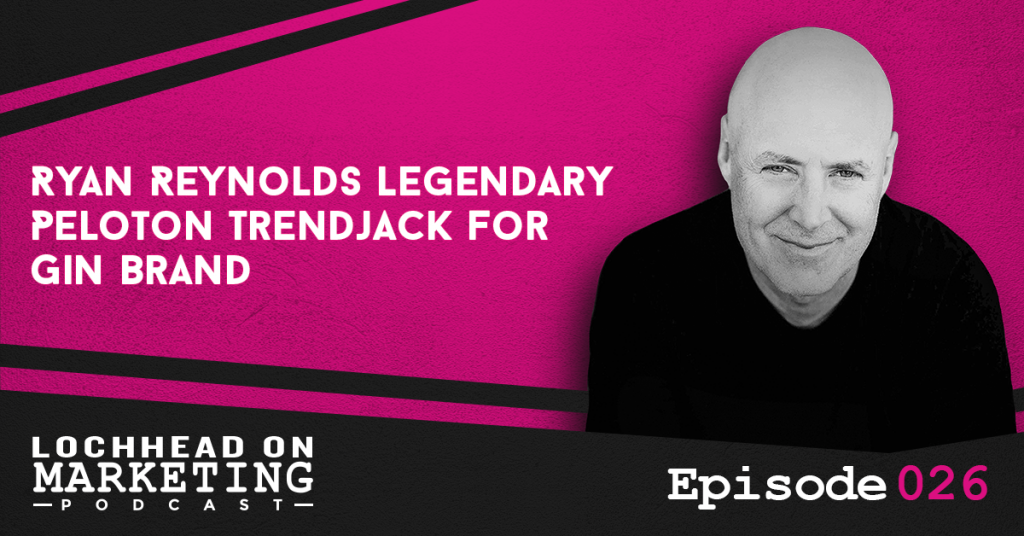
Podcast (lochheadonmarketing): Play in new window | Download (Duration: 10:56 — 15.0MB) | Embed
Subscribe: Apple Podcasts | Spotify | RSS | More
On episode #023 with Paul Maher, we popped the hood on the secret marketing / PR black art of Trendjacking. Recently, actor Ryan Reynolds (aka Marvel’s Deadpool) who also owns the brand, Aviation American Gin, just pulled off the trendjack of the year. Let’s break down the 8 reasons why this was a legendary trend jack.
The Peloton Ad
The Peloton Ad shows a rich couple, with the husband, giving his thin wife an exercise bike. There was a public uproar as reaction to the ad. In fact, Business Insider reported: “Peloton’s nightmare before Christmas: $1.5 billion vanished from its market value in 3 days amid holiday ad backlash.”
Additionally, Busines Insider reported “backlash over a holiday ad that has been widely panned as sexist, tone-deaf, and dystopian.” This forced Peloton to cut the cost of a monthly subscription to its workout apps.
Trendjack of the Year
Actor, celebrity, and owner of Aviation American Gin, Ryan Reynolds, pulled off, what Christopher claims, as the trendjack of the year. What he and his team did was, they inserted themselves into the controversy around the recent Peloton Bike Ad.
For less than $100K, they hired the actor who played the wife and shot a response ad.
“The ad is funny. It captures what it’s like to break up with somebody. It’s a real jab on Peloton and they never even mentioned the name Peloton.” – Christopher Lochhead
8 Reasons Why It’s Legendary
- They found a way to trendjack the biggest Ad flop of the year
- Radically FAST: They acted in a matter of days.
- Aviation’s response is pitch-perfect. People loved their response as opposed to the original, which was way off-pitch.
- Radically creative. In the ad, she has clearly left her husband who bought her the Peloton.
- The ad was built to be viral. It was posted on social media, starting on Ryan Reynolds’s Twitter.
- This was a move that is virtually impossible for their major competitors, such as Beefeater or Tanqueray, to pull off.
- They did it in “less that $100K.” (NY Times)
- This ad made them the good guys. Yahoo reports: “Ryan Reynolds says he hired actress from viral Peloton ad because backlash can be ‘alienating’”
“This example begs the question: how can we be radically smart, radically creative and radically fast to trendjack the news to build our brand and category?” – Christopher Lochhead
To hear more about Ryan Reynolds Legendary Peloton Trendjack For Gin Brand, download and listen to the episode.
Bio:
Christopher Lochhead is a #1 Apple podcaster and #1 Amazon bestselling co-author of books: Niche Down and Play Bigger.
He has been an advisor to over 50 venture-backed startups; a former three-time Silicon Valley public company CMO and an entrepreneur.
Furthermore, he has been called “one of the best minds in marketing” by The Marketing Journal, a “Human Exclamation Point” by Fast Company, a “quasar” by NBA legend Bill Walton and “off-putting to some” by The Economist.
In addition, he served as a chief marketing officer of software juggernaut Mercury Interactive. Hewlett-Packard acquired the company in 2006, for $4.5 billion.
He also co-founded the marketing consulting firm LOCHHEAD; was the founding CMO of Internet consulting firm Scient, and served as head of marketing at the CRM software firm Vantive.
Links:
AdWeek: “Greatest Sequel Ever”
We hope you enjoyed this episode of Lochhead on Marketing™! Christopher loves hearing from his listeners. Feel free to email him, connect on Facebook, Twitter, Instagram and subscribe on iTunes! You may also subscribe to his newsletter, The Difference, for some amazing content.
123 This Could Be Our Future w/ Yancey Strickler, Kickstarter Co-Founder
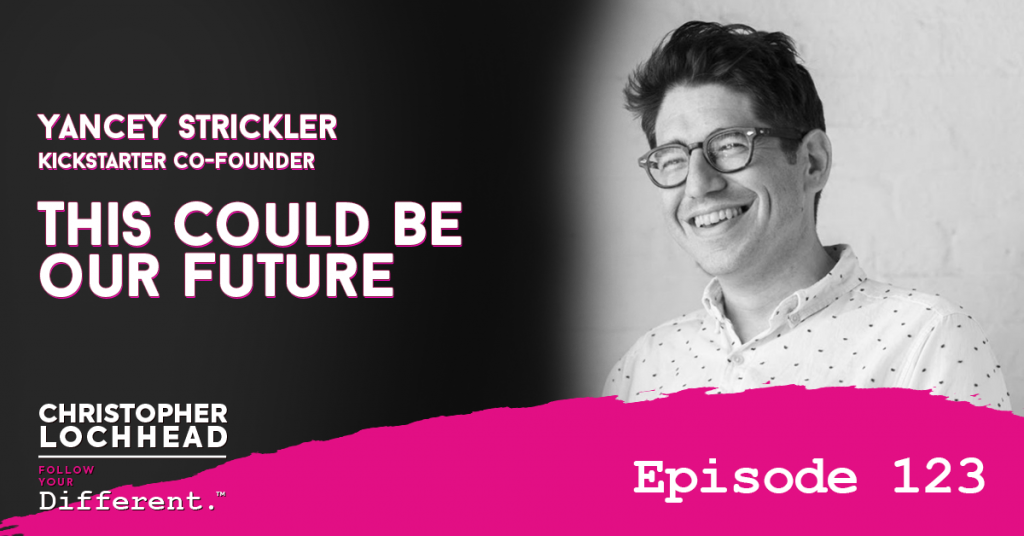
Podcast: Play in new window | Download (Duration: 1:05:28 — 90.0MB) | Embed
Subscribe: Apple Podcasts | Spotify | Pandora | RSS | More
Join us in another fascinating and timely discussion with Yancey Strickler, Co-Founder & former CEO of Kickstarter, one of the most important new companies in the Startup ecosystem. He is the author of the new book This Could Be Our Future: A Manifesto for a More Generous World.
Yancey is an experienced entrepreneur who shares very powerful insights that apply to your business and your life. Listen to our discussion about Bentoism. It’s an intriguing way to think about life.
A Chapter From The Book
In a chapter of Yancey’s new book This Could Be Our Future: A Manifesto for a More Generous World, he shares about Adele and how he found a startup company that measures loyalty and engagement. Adele faced issues with scalpers purchasing and jacking up prices of her concert tickets.
“Currently, we imagine that economics is how everything should be distributed and here, Adele, found some other value through which to make herself available.” – Yancey Strickler
Through the algorithm, Adele chose Top 30 per area of her most loyal fans. These people got access to tickets at their original prices. According to reports, fans were able to save 6 to 10 million pounds.
A New Lens in Doing Business
Yancey considers the Adele example as a powerful and pervasive lens in doing business. Adele found a could-have-been a post-economic way to distribute goods, placed a halt to that and ultimately, provided more value to her loyal fans.
“To me, that is a new kind of choice, a very new kind of decision. It is suggestive of what, of how capitalism evolves, of how we evolve as a society. Basically, where we all recognize the importance of financial value. We can also recognize the limitations of financial value being so dominant, as it is right now.” – Yancey Strickler
Social Entrepreneurship and Bentoism
Christopher and Yancey exchanged stories about social entrepreneurship and how it has become an emerging conversation right now. Yancey believes that social entrepreneurship will succeed when it becomes a dominant point of view of everyone.
“Right now, marrying a financial purpose for a nonfinancial purpose is like the cute indie thing to do. But we should root for this to be like mainstream arena rock. I want this, headlining stadiums.” – Yancey Strickler
Yancey also shares his idea on Bentoism or Beyond Near Term Orientation. He came up with this idea when he was doodling and creating graphs while evaluating what he wants at the moment and what he would want to achieve in the future.
To hear more about This Could Be Our Future and more information about Yancey Strickler, Kickstarter Co-Founder, download and listen to the episode.
Bio:
Yancey Strickler is a writer and entrepreneur. He is the cofounder and former CEO of Kickstarter, author of This Could Be Our Future: A Manifesto for a More Generous World, and the creator of Bentoism.
Yancey has been recognized as a Young Global Leader by the World Economic Forum and one of Fast Company’s Most Creative People.
He’s spoken at the Museum of Modern Art, Sundance and Tribeca Film Festivals, Web Summit, and events around the globe.
He cofounded the artist resource The Creative Independent and the record label eMusic Selects. Yancey grew up in Clover Hollow, Virginia, and began his career as a music critic in New York City.
Links:
Book: This Could Be Our Future: A Manifesto for a More Generous World.
We hope you enjoyed this episode of Follow Your Different™! Christopher loves hearing from his listeners. Feel free to email him, connect on Facebook, Twitter, Instagram and subscribe on iTunes! Get amazing, different stories on business, marketing, and life. Subscribe to our newsletter The Difference.
025 Category Creation & Category Design: A New Lens On Business
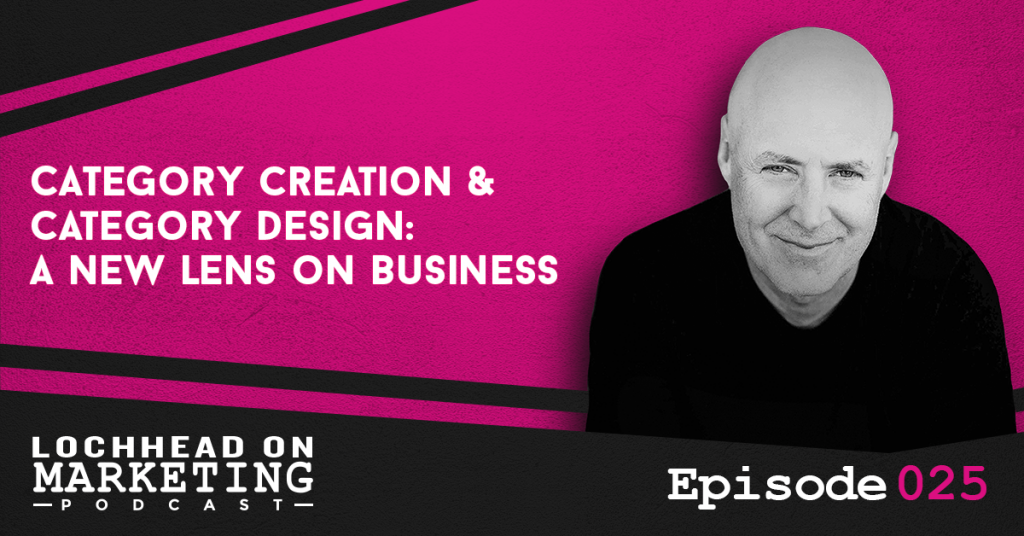
Podcast (lochheadonmarketing): Play in new window | Download (Duration: 19:55 — 27.5MB) | Embed
Subscribe: Apple Podcasts | Spotify | RSS | More
In this episode, Christopher Lochhead takes listeners on an exercise in developing their eye for category creation and category design. Category Design is a new level of thinking in business. It is a whole different approach to marketing and Christopher stresses its importance in building a legendary business.
See Things Differently
Kevin Mainey wrote in the book Play Bigger, that “category design is a new lens on business. Once you have that lens, you see things in a very unique way.” However, listeners often ask Christopher how can they specifically apply these to their businesses.
In this episode, Christopher uses a recent story in the WSJ as an example of how category design is powerful force, that most people don’t know is there. He breaks down a recent story about Google buying FitBit, with the hopes of assisting listeners on how to develop their eyes and ears on category design lens.
Google Buys Fitbit: A Category Design Example
Headline:
Google to Buy Fitbit, Amping Up Wearables Race
By Rob Copeland and Patrick Thomas
Updated Nov. 1, 2019
Sub-head:
Deal to acquire maker of wearable fitness products for $2.1 billion extends Google’s reach in consumer electronics
Wearables is a niche in the consumer electronics mega category.
Google reached a deal to buy wearable fitness products company Fitbit Inc. FIT 15.53% for roughly $2.1 billion, a move that intensifies the battle among technology giants to capture consumers through devices other than smartphones.
Category name before company name, its an example of the fact that people need to know what it is, before knowing who it is. The second sentence is framing the category battle.
For Google, the deal marks a further push into health. as it faces regulatory threats to its massive internet-search and advertising business.
Underscoring Google moving into mega category of health tech, then stating Google’s category king positing in search.
It also puts Google in renewed and direct competition with Silicon Valley neighbor Apple Inc., which in the past week said rising sales of wearables and related services were becoming a bigger driver of its business.
Framing the competition in new wearables category and wearables category growth.
Google’s parent Alphabet Inc. will spend just a sliver of its $121 billion cash hoard to branch out with Fitbit’s products. Alphabet’s $2.1 billion bid was for $7.35 a share in cash, a 19% premium to Fitbit’s closing price Thursday and more than 70% above where the stock was trading last week before deal talks were first reported by Reuters.
Speaks to the premium price category queens get in M&A.
Fitbit shares rose more than 15% to $7.14 on Friday, while Alphabet’s shares ticked up slightly.
The deal lands at a moment when Google and other tech giants are under scrutiny on a number of fronts over their competitive practices and dominance of certain businesses,
“certain businesses” means categories. This points to the domination category queens achieve.
including through acquisitions. But the Mountain View, Calif., company continues to expand aggressively.
Translation: moves into new categories through internal efforts and M&A.
Founded in 2007, Fitbit makes so-called wearables, or watches and bracelets that primarily track health information like heart rate. Such products have fascinated Silicon Valley
Speaks to early adopters embracing the category.
where technology executives of all ages proudly wear rings and other devices to track sleep and “hack” their own personal performance.
Wearables (category name) have proved far less popular with the broader public. Google several years ago launched a brand of smart glasses that attracted as much ridicule as buyers, and Snap Inc. likewise got a lukewarm response to its hyped Spectacles line.
Speaks to the trouble the “wearables” category have had breaking past early adopters to hit a main-stream tipping point. This is normal in the early days of a category. Also note, categories will NOT tip until a category queen emerges. Mainstream buyers want a safe option. AND they do NOT want to compare. They want to buy.
Fitbit traded for $45 soon after it went public in 2015, but the stock has cratered in the past few years as the company ceded market share to Apple and its smartwatch.
Speaks to the category battle with Apple
With its fitness offerings, Fitbit collects myriad and personal data on users that it in turn uses to suggest exercises and other lifestyle changes. And its sale is bound to raise issues around consumer privacy. In announcing the acquisition, Google said it wouldn’t use Fitbit data to help power its massive online advertising business.
Speaks to data as a seminal driver of category flywheels
“Similar to our other products, with wearables, we will be transparent about the data we collect and why,” Rick Osterloh, the head of Google’s hardware division, said in a statement. ”We will never sell personal information to anyone. Fitbit health and wellness data will not be used for Google ads. And we will give Fitbit users the choice to review, move, or delete their data.”
Apple in many ways is a model for what Google hopes to accomplish.
While the Apple Watch was initially a disappointment, sales have picked up lately; and the company’s AirPods were an immediate hit. The iPhone maker said on Wednesday that sales in its wearable business (category name) soared 54% in the latest quarter.
Facebook is also in the wearables mix. This fall the social-media giant reached a deal to buy CTRL-Labs Inc., a startup that develops devices that can interface with the brain.
“We’re talking about data that used to be impossible to collect on a mass scale,” Craig Hallum analyst Alex Fuhrman said. “Only since the beginning of the Fitbit era (new category pioneered by FitBit) have consumers been walking around with wearables that monitor their heart nearly 24 hours a day.”
Google’s hardware line (category) for now consists mostly of slow-selling products like the Chromebook laptop and Pixel smartphone.
Google has spent billions on targets like HTC Corp. , a smartphone maker, and Nest, a home hardware company, with little to show for it in sales, analysts say. Google doesn’t break out financial performance for its hardware division.
It hired Mr. Osterloh, a former Motorola president, in 2016 to steer the nascent unit. In an interview with The Wall Street Journal last month, Mr. Osterloh often referred to the hardware division as a “startup” within the conglomerate.
“I think eventually this will be a very large, important business,” he said.
Some observers remain skeptical. “The acquisition is another example of Google tilting at windmills” in hardware, analysts at Wedbush Securities wrote in a report Friday. “Google is uniformly bad at consumer products in our view, and appears to us to be intent on spending whatever it takes to prove our view wrong.”
Fitbit says it has sold more than 100 million devices world-wide since its founding, and currently has more than 28 million active users.
“Google is an ideal partner to advance our mission” said James Park, a Harvard University dropout who co-founded Fitbit.
Category creators tend to self-identify as mission driven
“With Google’s resources and global platform, Fitbit will be able to accelerate innovation in the wearables category, scale faster, and make health even more accessible to everyone,” he said in a statement.
The deal is expected to close next year, the companies said.
Fitbit’s results have been pressured in recent months. In July, it lowered its full-year revenue outlook after weaker-than-expected sales of its new smartwatch model, Versa Lite.
The smartwatches (sub-category name of wearbles category) are aimed at competing with popular offerings from Apple and Samsung Electronics Co.
Still, the company reported narrower losses in the second quarter as sales of its fitness trackers jumped 51% and the health division showed some strength. Fitbit is scheduled to release its third-quarter earnings report Nov. 6.
—Sarah E. Needleman contributed to this article.
***
So whats the point?
Here’s an article, that most people in business would read as, one company buying another company. In a marketing perspective, it underscores the fact that Google is buying the leading position in a hot new growth category.
“They’re not just buying FitBit or its products or its customers or its technology. They’re buying a position in a category, just like what they did, for example, when they bought Youtube.” – Christopher Lochhead
Christopher hopes that this exercise helped you understand category lens a little bit better.
“I would urge you in your next business discussion and the next arti8cle you read in the Wall Street Journal, or whatever else you read, start to think about these things from a category perspective. How they’re talking about, often is really a description of a larger set of dynamics happening over all in the marketplace.” – Christopher Lochhead
Bio:
Links:
122 Legendary Lighting & Nightclub Designer Steve Lieberman
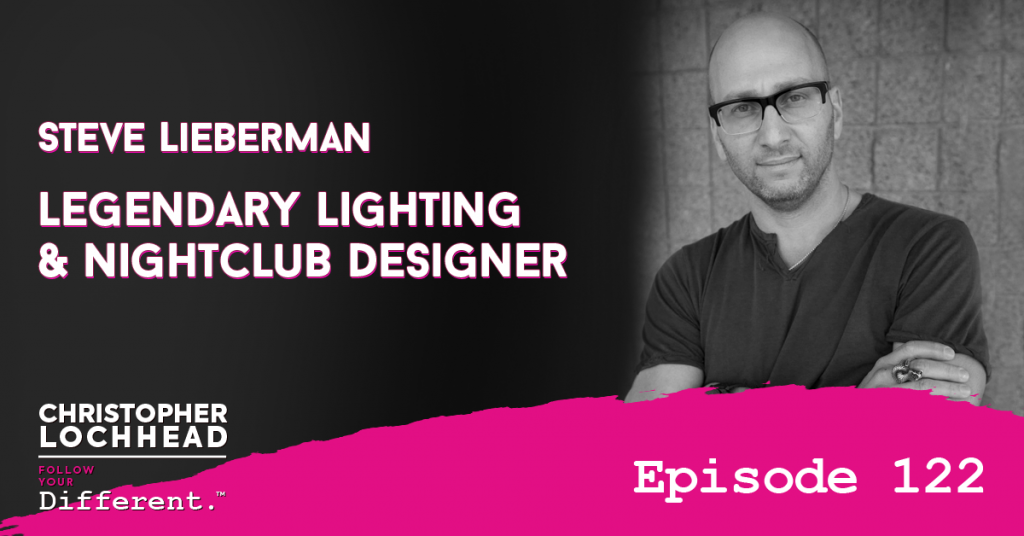
Podcast: Play in new window | Download (Duration: 57:55 — 79.5MB) | Embed
Subscribe: Apple Podcasts | Spotify | Pandora | RSS | More
Today, entrepreneur and the incredibly creative guy Steve Lieberman, Founder & CEO of SJ Lighting, joins us today for another riveting conversation. Steve and his team have had a hand in almost every nightclub and electronic music festival in the US for the last ten years. He shares how he creates a lasting impact on attendees and how the whole production process goes, from planning to execution.Monumental Impact
Even at a young age, he shares how he finds big, monumental art pieces as impactful. He carried on this astonishment for impactful art as he pursued a career in events production, specifically focusing on lights.“Whether it’s a big show or a little show, its 100,000 or 300-people-intimate-club-show, we like impact. An audience is coming to some show, they want to be moved. They want to be stimulated.” – Steve LiebermanSteve Lieberman has worked with more than 50 clubs and major festival brands like Electric Daisy Carnival, Coachella, Ultra, Lollapalooza, Rolling Loud and many more.
Similar Philosophies
Steve shares how he and his colleagues share the same philosophies when it comes to event production. He further describes the whole lighting experience as “fluid with the music” as it is a visual representation of what the music is.“When an audience comes in there, we have their attention and we want to give them something that they’re gonna live with. I want them to leave that show and have something specific. It doesn’t need to be ten things. Whether it’s visual, oral—something that they heard—just part of their experience that they’re going to take with them and they’re going to keep that forever.” – Steve Lieberman
Puzzle Pieces
Steve describes how every show is a little bit different. He says that there is no linear path from a to b. As a designer, it’s not just taking out a worksheet and figuring out math problems. He sees production as fitting different pieces of a puzzle. The design, procedures, modify based on what’s required and is highly dependent on the scale of the show. He shares he has to absorb all the information of what the show is, what the performers might prefer and who are the headlining artists.“I’d like to think, the promoters and basically, the guys who write the checks for the show, we’re on the same team. At the end of the day, my contracts are 99.9% with them. My priority is to protect their best interest.” – Steve LiebermanTo hear more about Legendary Lighting & Nightclub Designer Steve Lieberman, download and listen to the episode.
Bio:
Steve Lieberman has been working in the festival and nightclub community since 1987. As a teen exploring NYC nightlife, he saw the potential of enhancing the events visually and got involved as a lighting designer for warehouse parties. This led naturally to stage design as his career picked up steam. By the time he moved to California in 2001, Steve’s reputation for next-level work made him a no-brainer for Insomniac, who came knocking at his door. Some of Steve’s favorite projects of the past 25+ years are not necessarily the largest; he recalls fondly several side stages at EDC LA in the late nineties, such as one bassPOD stage consisting of a complete grid of LED fixtures laid into a matrix creating a truly dynamic perspective, and another stage with sets of stairs leading in all directions à la MC Escher. Steve approaches each show, each stage, each environment with special attention based on the needs of the producer, the artist riders and the creative concepts. The primary principle to which Steve has held true all these years is not to fight your environment but to embrace it.Links:
SJ Lighting How I Made It: Steve Lieberman got his start lighting illegal warehouse parties. Now, it’s Coachella. An Interview With Steve Lieberman: Founder of SJ Lighting We hope you enjoyed this episode of Follow Your Different™! Christopher loves hearing from his listeners. Feel free to email him, connect on Facebook, Twitter, Instagram and subscribe on iTunes! Get amazing, different stories on business, marketing, and life. Subscribe to our newsletter The Difference.121 Secrets of Sand Hill Road Venture Capital, w/ Scott Kupor Managing Partner, Andreessen Horowitz
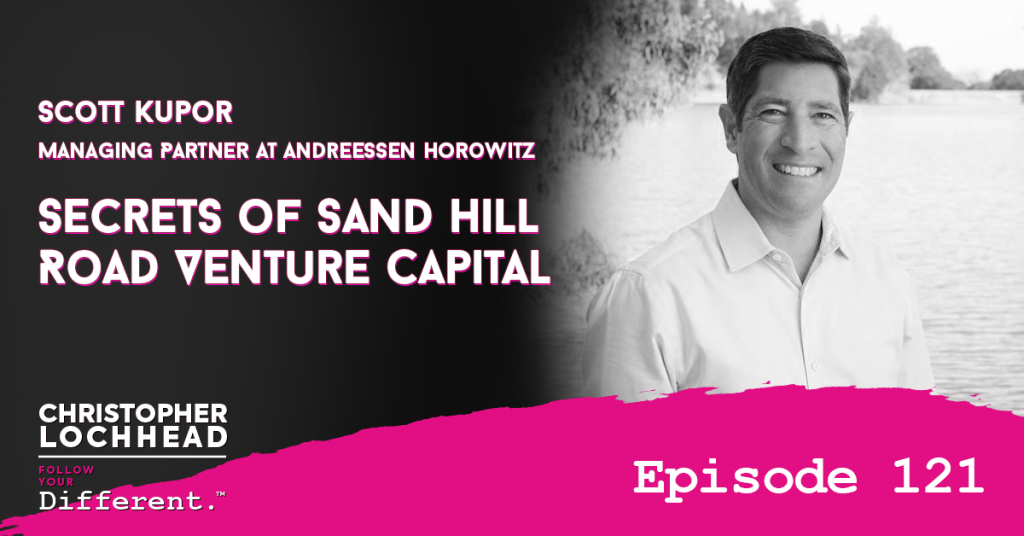
Podcast: Play in new window | Download (Duration: 1:01:29 — 84.5MB) | Embed
Subscribe: Apple Podcasts | Spotify | Pandora | RSS | More
In another riveting episode, Scott Kupor, the managing partner of one of the highest-profile VC on the planet over the last decade, Andreessen Horowitz, joins us today to discuss startups, how to get funded and a lot more! He is also the author of the book called Secrets of Sand Hill Road: Venture Capital and How to Get It.“Inside Baseball”
Scott addressed the common issue of “inside baseball” between entrepreneurs and VCs. He shares that there is no reason why questions shouldn’t be answered and that VCs should reach out to entrepreneurs.“People don’t understand why decisions are made. I think that just leads to mistrust quite frankly between VCs and entrepreneurs.” – Scott KuporMoreover, Scott shares the reason why he wrote the book. He wanted to bridge the gap between VCs and entrepreneurs. Through this book, he answers several entrepreneur questions that previously were assumed to be understood, since they have done a lot of deals in the past.
Information Asymmetry
Scott discusses the idea about information asymmetry and how it results to one party benefitting at the expense of the other in those types of scenarios.“Capital is scarce and VCs have it. There was definitely a very different balance of power between entrepreneurs and VCs. There’s probably less incentive quite frankly for the VC. The biggest change, I think, in the last 10 yrs is, its as competitive as its ever been.” – Scott KuporMoney clearly a commodity in this business. For Scott, if VCs and entrepreneurs can level the playing field, he would enter into a relationship on a basis of actually understanding one another, knowing what motivates one another as it would definitely be a good place better place to start.
More From Scott
Aside from talking about Silicon Valley, Startups and how entrepreneurs could get funding, he shares his thoughts on the overall VC backed industry.“My personal view is—I’ve talked about this with people in DC publicly—the idea that more and more growth is happening in the private markets, while beneficial, selfishly for people like me, who get to, kind of monetize that growth. I don’t think its good for the country. I don’t think its good to not have companies going public at a reasonable stage where a broader cross-section of public market investors can actually enjoy the appreciation there.” – Scott KuporTo hear more about Secrets of Sand Hill Road Venture Capital and more information about Scott Kupor, Managing Partner at Andreessen Horowitz, download and listen to the episode.

